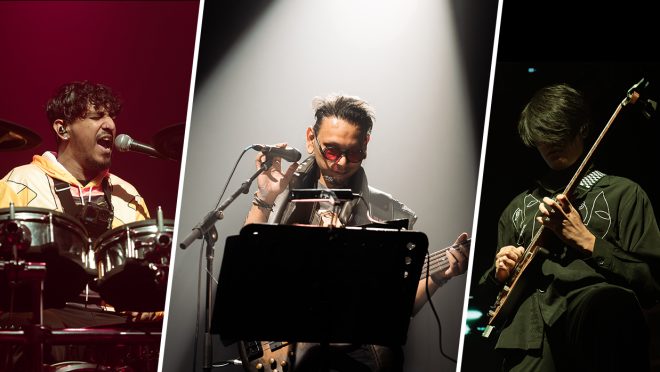Aurthohin’s nu-horizon
Aurthohin’s nu-horizon

“In fact, we’re aiming to create a whole new genre with our next album, which we’re calling Bangla Nu-Rock,” this is what Bassbaba Sumon told us last October as we were discussing Aurthohin’s ambitions regarding upcoming compositions.
A year down the line, when asked how his plans for this “new genre” were panning out, he said with reassurance, “It’s happening.”
Today Aurthohin releases ‘Phoenix er Diary-2’, their ninth studio album and the sequel to their 2022 album ‘Phoenix er Diary-1’. Sumon claims when it comes to his newly coined genre, the prequel was the appetiser to the main course that Aurthohin is serving with Phoenix er Diary 2.
“There are 8 tracks on the album and 60% of it is Bangla Nu-Rock. The rest, sound like the Aurthohin of old,” said the ever-flamboyant bassist.
For Aurthohin, this is a concept that brewed over time within the band while they were in search of a sound they could innately call their own.
Sumon feels bands invariably end up sounding like other bands they have taken inspiration from, even saying Aurthohin themselves have done songs which sonically would be no different to some global western heavy weight bands. But he feels there was always space for creating an identity of Bangladesh’s own sound.
“Bangladesh has existed for over fifty years, but even from the times of our independence to this day, it’s still the Lalon Sangeet and Rabindra Sangeet that we identify with. We never had our own sound or genre, at least not in band music or the rock scene. Which is where we wanted to introduce something modern, with a touch of Bangali traditional sounds,” said Bassbaba.
These terms might sound a bit too gimmicky to some, but the idea of calling it Bangla Nu-Rock actually came out of a process of elimination rather than careful selection. Bassbaba often shares his music with artists around the world, and even seasoned musicians — including five-time Grammy-winning bassist Victor Wooten — have struggled to categorise some of Aurthohin’s newer tracks within any specific subgenre of rock or metal. In simpler terms, Bassbaba describes the sound as a fusion of moderately heavy music blended with the modern sonic elements found in contemporary rock.
“It sounded weird. But I believe sometimes weird is good and weird is new. And we have always strived for something new,” said Bassbaba.
Sumon points out that one of the main reasons Aurthohin’s albums sound distinct from one another is the lineup changes over the years. Each time a new member joins, he believes the band’s overall sound and the direction leading up to the next album naturally evolves as well.

Even among the country’s biggest bands, it’s rare to see new members actually contribute to an upcoming album right away. Often, the solos or drum parts are still recorded by former members, leaving little room for fresh creative input.
Aurthohin, however, claims to have always done the opposite. They’ve consistently embraced the ideas of new members, allowing each lineup to shape the band’s sound in unique ways. That spirit of collaboration, Sumon adds, is what keeps their music evolving — a sentiment echoed by drummer Mark Don, who recently marked ten years with the band.
“Sumon bhai has his plans and vision when it comes to every Aurthohin recruitment. Which is why he is always receptive to anything we have to offer. It was overwhelming at first when I recorded Cancer er Nishikabyo in 2016, but it has gotten very streamlined ever since,” said Mark.
Even though Bassbaba’s musical prophecy reeks of exclusivity and an effort to stand out when it comes to Bangla rock music, Mark reiterated that it’s not that difficult to tune into the vision.
“Every time Sumon bhai comes up with ideas and plans, he is very convincing. So it’s never difficult to buy into the projects,” Mark added.
When it comes to Aurtoihin’s strive for sounding “new”, their new guitarist Ehtesham Ali Moeen, who just turned 24 a couple of nights ago, comes into the equation. Sumon discovered him to be a very modern-sounding guitarist—something you can take out of the Polyphia or Tim Henson sounding school of thought.
“Ehstesham perfectly fits the type of guitarist we needed for Bangla Nu-Rock,” said Bassbaba.
The selection process proved challenging for Moeen. While Bassbaba was enthusiastic about bringing in a new-generation guitarist—one who, as Polyphia’s Tim Henson jokes, doesn’t rely on “boomer bends” or the classic guitar styles of the ’60s and ’80s—Sumon insisted that the new recruit must also be capable of playing Aurthohin’s older tracks, which were rooted in a very different style of guitar work.
To bridge that gap, Moeen spent six months training daily with drummer Mark, refining techniques that didn’t come naturally to him at first and ensuring he could seamlessly blend the old with the new.
“Everything that we composed on the album was directed by Sumon bhai. I followed suit as I am still trying to get into the flow,” said Moeen.
In just a few days, Aurthohin will be going on their maiden voyage to the US for a series of concerts across multiple states and cities. Although they won’t be performing any of their tracks from the new album, Sumon feels it’s the time during which fans can allow the songs to grow on them.
“Phoenix er Diary-2 is the most experimental album Aurthohin ever came up with. The ones who have a taste for modern sounds. Aurthohin’s songs will always take time to grow on you,” concluded Bassbaba Sumon.


